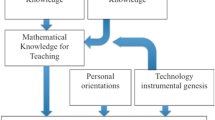Abstract
What is the connection between advanced mathematics and teaching secondary mathematics? I address this question, drawing on insights from the Special Issue on “Personal Mathematical Knowledge in the Work of Teaching” (CJSMTE 13(2), 2013) and reflecting on my personal teaching experience.
Résumé
Quel est le lien entre les mathématiques avancées et l'enseignement des mathématiques au secondaire ? J'aborde cette question en m'appuyant sur les enseignements du numéro spécial intitulé « Connaissances mathématiques personnelles dans le travail d'enseignement » (CJSMTE 13(2), 2013) et en réfléchissant à mon expérience personnelle d'enseignant.
Similar content being viewed by others
Notes
Not surprisingly, Sophie gets almost perfect teaching evaluations from her students.
The counterpart “PEMDAS” used in the USA has received significant attention in popular media and online discussions, see for example https://www.nytimes.com/2019/08/02/science/math-equation-pedmas-bemdas-bedmas.html
References
Barton, B., & Paterson, J. (2013). Does mathematics enhance teaching? Does summer hiking tone winter thighs? Canadian Journal of Science, Mathematics and Technology Education, 13(2), 198-212.
Chick, H., & Stacey, K. (2013): Teachers of Mathematics as Problem-Solving Applied Mathematicians, Canadian Journal of Science, Mathematics and Technology Education, 13(2), 121-136.
Cooper, J., & Pinto, A. (2017). Mathematical and pedagogical perspectives on warranting: approximating the root of 18. For the Learning of Mathematics, 37(2), 8-13.
Even, R. (2011). The relevance of advanced mathematics studies to expertise in secondary school mathematics teaching: Practitioners’ views. ZDM - Mathematics Education, 43(6–7), 941–950.
Glen, L., & Zazkis, R. (2020). On linear functions and their graphs: Refining the Cartesian connection. International Journal of Science and Mathematics Education. https://doi.org/10.1007/s10763-020-10113-6.
Hurst, C. (2017). Provoking contingent moments: Knowledge for ‘powerful teaching’ at the horizon. Educational Research, 59(1), 107-123.
Mamolo, A., & Pali, R. (2014). Factors influencing prospective teachers’ recommendations to students: Horizons, hexagons, and heed. Mathematical Thinking and Learning, 16(1), 32-50.
Marmur, O., Yan, K., & Zazkis, R. (2020). Fraction images: The case of six and a half. Research in Mathematics Education, 22(1), 22-47.
Mason, J., & Davis, B. (2013). The importance of teachers’ mathematical awareness for in-the-moment pedagogy. Canadian Journal of Science, Mathematics and Technology Education, 13(2), 182-197.
Papert, S. (1980). Mindstorms: Children, computers and powerful ideas. Basic Books
Rowland, T., & Zazkis, R. (2013). Contingency in the mathematics classroom: Opportunities taken and opportunities missed. Canadian Journal of Science, Mathematics and Technology Education, 13(2), 137-153.
Rowland, T., Thwaites, A., & Jared, L. (2011). Triggers of contingency in mathematics teaching. In B. Ubuz (Ed.), Proceedings of the 35th conference of the International Group for the Psychology of Mathematics Education (Vol. 4, pp. 73–80). Ankara, Turkey: International Group for the Psychology of Mathematics Education.
Wasserman, N. (2016) Nonlocal mathematical knowledge for teaching. In Csíkos, C., Rausch, A. & Szitányi, J. (Eds.). Proceedings of the 40th Conference of the International Group for the Psychology of Mathematics Education, Vol. 4, pp. 379–386. Szeged, HU: PME.
Wasserman, N. H. (2018). Knowledge of nonlocal mathematics for teaching. The Journal of Mathematical Behavior, 49, 116-128.
Watson, A., & Chick, H. (2013). Introduction to the Special Issue on Personal Mathematical Knowledge in the Work of Teaching. Canadian Journal of Science, Mathematics and Technology Education, 13(2), 111-120.
Watson, A., & Harel, G. (2013). The role of teachers’ knowledge of functions in their teaching: A conceptual approach with illustrations from two cases. Canadian Journal of Science, Mathematics and Technology Education, 13(2), 154-168.
Yan, K., Marmur, O., & Zazkis, R. (2020). Calculus for teachers: Perspectives and considerations of mathematicians. Canadian Journal of Science, Mathematics, and Technology Education, 20(2), 355–37.
Zazkis, R. (2017). Order of operations: On conventions, mnemonics and knowledge-in-use. For the Learning of Mathematics, 37(3), 18-20.
Zazkis, R. & Leikin, R. (2010). Advanced mathematical knowledge in teaching practice: Perceptions of secondary mathematics teachers. Mathematical Thinking and Learning, 12(4), 263-281.
Zazkis, R. & Mamolo, A. (2011). Reconceptualising knowledge at the mathematical horizon. For the Learning of Mathematics, 31(2), 8-13.
Zazkis, R., & Rouleau, A. (2018). Order of operations: on convention and met-before acronyms. Educational Studies in Mathematics, 97(2), 143-162.
Author information
Authors and Affiliations
Corresponding author
Ethics declarations
Conflict of Interest
The author declares that she has no conflict of interest.
Additional information
Publisher’s Note
Springer Nature remains neutral with regard to jurisdictional claims in published maps and institutional affiliations.
Rights and permissions
About this article
Cite this article
Zazkis, R. Personal, Nonlocal, Tacit: On Mathematical Knowledge in Teaching. Can. J. Sci. Math. Techn. Educ. 20, 647–656 (2020). https://doi.org/10.1007/s42330-020-00118-2
Accepted:
Published:
Issue Date:
DOI: https://doi.org/10.1007/s42330-020-00118-2




